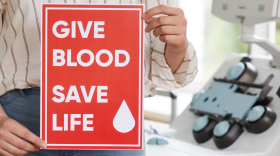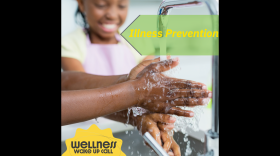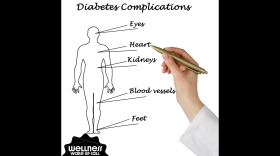
Kristin Bogdonas
Host, "Wellness Wake Up Call"Kristin Bogdonas began employment with University of Illinois Extension in August 2013 and serves Henry, Mercer, Rock Island, and Stark counties in her role as nutrition & wellness educator. Bogdonas provides research-based programs and resources to diverse audiences via experiential, interactive programming as well as web-based platforms and social media outlets. She strives to inspire healthy lifestyles in others so people can live their best lives.
She is focused on chronic disease prevention and management, food preservation, food safety, and fostering partnerships to create a culture of wellness where people live, learn, work, and play. She also mentors students and provides hands-on opportunities in community nutrition education.
Bogdonas earned her Bachelor of Science degree from Illinois State University with a concentration in nutrition and dietetics. She then went on to complete her Master of Public Health degree from Southern Illinois University. She has certifications to teach Navigating Difference, Trauma Informed Care, Fit & Strong, and ServSafe for certified food protection managers.
-
This episode of Wellness Wake Up Call shares practical tips for supporting healthy circulation during the winter months. Listeners learn how cold temperatures affect blood flow and simple steps they can take to keep blood moving through regular activity, proper warmth, and balanced nutrition.
-
This episode of Wellness Wake-Up Call explores the main components of blood and the important roles they play in keeping the body healthy. Listeners learn how plasma, red blood cells, white blood cells, and platelets function, and why routine blood tests can offer valuable insight into overall health.
-
This episode of Wellness Wake-Up Call explores the factors that affect blood donor eligibility during National Blood Donor Month. Listeners learn about age and health requirements, medical considerations, and donation timelines, along with why understanding eligibility helps maintain a reliable blood supply. Content provided by Kristin Bogdonas, food and nutrition educator with University of Illinois Extension.
-
This January episode of Wellness Wake-Up Call highlights National Blood Donor Month and the lifesaving impact of blood donation. The segment explains how donated blood supports patients in need, why shortages are common during the winter months, and how easy and safe the donation process can be.
-
As we step into a brand-new year, I want to pause and ask: What did last year teach you about yourself? Too often, we rush into resolutions without taking time to reflect. But reflection gives us clarity, and clarity fuels growth.
-
The flu and many colds are caused by viruses, which cannot be treated with antibiotics. However, preventing a cold and getting rid of the symptoms may be of high priority. Here is how our diet can play a role.
-
Many people experience heightened stress during the holidays, but there are ways to manage it. The “perfect” holiday rarely exists. Let go of trying to make everything flawless and focus instead on what truly matters—connection, gratitude, and rest. Here are five tips to help make the holiday season a little less stressful.
-
Figuring out what to eat when you have diabetes can sometimes feel overwhelming, and this can be especially true during the holidays.
-
Did you know if you give yourself insulin, you are MORE likely to experience hypoglycemia, also known as low blood sugar?
-
Did you know that high blood sugar can damage nearly every system in the body? Let’s dive into what’s really at stake.










